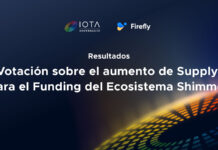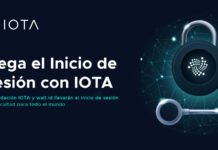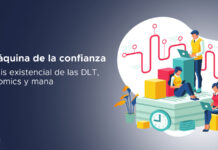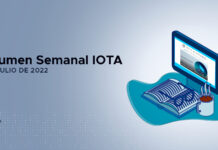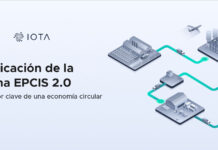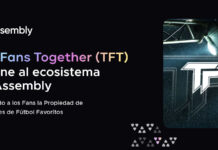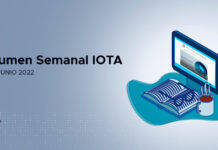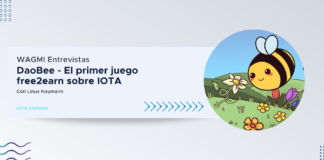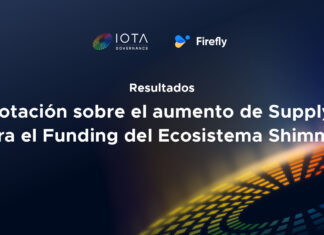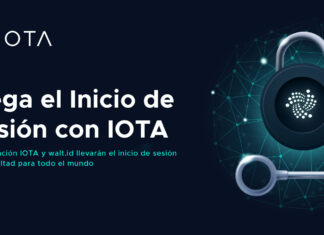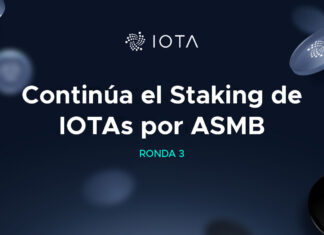A few months ago, I was surfing the internet searching for IOTA news when I came across a video titled 100 Billion Reasons Why… it made me see beyond the current limitations of Blockchain and also showed me the advantages of IoT technology more explicitly. This speech at the Blockchain Opportunities Summit, held in Toronto, was given by Terry Shane President & CEO of Refined Data Solutions and Founder at the bIOTAsphere
Carpincho Dem introduced me to him and from there and after dozens of emails, we were able to carry out the interview that you will see below. Accessible from the first moment, I appreciate his kindness and willingness to give me this interview opportunity in the middle of his vacations.
Take a few minutes and met a man whose technological vision, intends to always be one step ahead.
Gabriela Jara
Writer & Editor, IOTA Hispano
IOTA Evangelist Network member
If you like what we are doing help us to continue working! Donate: CDJ9RVDPJRAIULRAEONDLZGM9VSKFSSOUFSQOAJPDPTFOOCVGGWVMDJQVPYHEOERGL9NQD9OAWYAIBTMC9CIRZREYC
Terry, tell us a little about you, and Refined Data Solutions
I’ve been described as a serial inventor. Growing up, I loved taking stuff apart just to see how it worked and I still have a fascination with new technologies. I’ve owned and run three successful data-centric software companies, one of which was sold to a public entity in 2000. In the mid 90’s I became interested in the emerging Internet and built my first web site, hand-coding the HTML and writing my own cgi scripts to provide a user interface and an API to large back-end databases that were previously inaccessible to the general public. That site provided online access to the US and Canadian postal code directories so anyone could look up a mailing address or postal code in North America. In 1996 Yahoo ranked us as the 9th most useful site on the Internet. Ironically, they had to publish their “Top 100” lists at that time in a printed magazine called Yahoo Internet Life because so few people knew where to go for information about available online resources.
Later, I launched a successful online-dating site and several other initiatives that all harnessed the idea of linking data with a computer-based user experience to deliver highly personalized solutions that catered to an audience of one.
I have a number of patents to my name including some from those early Internet days, and I see significant parallels between the current state of the Distributed Ledger space and the early evolution of the web. Back in the late 90’s I served on one of the boards of the Canadian Marketing Association (CMA) and used to do a lot of lecturing to corporations about how the Internet would change the way that businesses would communicate in the future. Most senior executives at that time simply couldn’t understand how dramatic that transformation was going to be. Even the President of the CMA remarked to me that he could see no possible value for the Association in having their own web site. I hear his voice echoing in my head every time I hear someone tell me that they don’t see the point of cryptocurrency.
Refined Data Solutions was founded over 10 years ago, together with my good friend and business partner Hugh Molyneux, and we’re a traditional SaaS-based, software company that delivers solutions in two distinct areas; Portfolio management for large Property Management companies, especially related to Sustainability, Environmental Risk, Compliance and Greenhouse Gas monitoring. Our other division deploys Live Virtual Classroom environments that are used by leading global Universities and Corporate Training Departments to deliver remote learning that exceeds the integrity of in-person instruction.
When and how did you discover the crypto world, and what was the first coin you bought?
I first heard about cryptocurrency from my wife in 2016. She’s not a techie by any stretch of the imagination, but after reading some articles about Bitcoin, I remember her saying that this was something I should look in to. She never lets me forget that! I opened an Exchange account and began playing with mobile wallets and paper wallets to see how it all worked in practice. I thought that it would provide the answer to the challenges of moving value around the globe and solve issues for unbanked populations in developing countries. With family back in the UK, it seemed crazy to me that in 2016 I could send an email to the other side of the planet in a matter of seconds but that sending money overseas still took days or weeks.
My investment advisor (at one of the big Canadian Banks) strongly warned me against putting any funds in crypto because it was used by “criminal” elements and was associated with gambling and pornography. Those were exactly the same early adopters of the nascent Internet, which only increased my interest level, and that’s when I decided to take the plunge and make crypto a significant component of my investment portfolio. A year later, that same investment advisor was sheepishly asking me if I could help him to start investing in crypto.
In early 2017 I met Vitalek Buterin in Toronto and traded all of my Bitcoin for Ethereum which seemed to hold the promise of being so much more than a simple store of value. I was convinced at that time that combining the power of a distributed ledger with smart contracts and distributed computing was the future. I still hold some Ethereum but most of my current holdings are in IOTA. I have not bought any ICOs or other alt-coins as I am primarily interested in investing in the underlying protocols that will power the next information revolution.
What was your first approach to IOTA?
I have always enjoyed sharing knowledge, and teaching others about emerging technology. I’ve found from experience that the more you share, the more you get back. I had been telling family, friends and colleagues about crypto for a while and in May of 2017 I even sent an email to all my employees telling them that the crypto space was going to be the next wave of innovation heralding the same sort of transformation that I’d seen in the early days of the Internet. Most people rolled their eyes when I would raise the subject but a few really embraced the concepts and got involved. My daughter and her boyfriend both began investing in Ethereum and learning about the technology and in late July he sent me a one line email that read; “have you heard of IOTA? It looks very interesting”
I’ve been hooked ever since.
Knowing the problems of global warming on our planet, do you consider that bitcoin mining adds another problem to the environment?
Blockchain mining (not only Bitcoin mining) is not the problem, it’s greed; Human Beings will almost always pursue their own self-interests, even if doing so will harm others or the environment. Many of our current economic models are fundamentally flawed, leading to the ever increasing disparities between rich and poor. We’re polluting the oceans and the land with the by-products of our throw-away society when what we’re really throwing away is the environment and compromising the future for the generations that will follow us. Mining is simply another example of greed trumping common sense. Miners are essentially taking advantage of their ability to arbitrage electricity, buying it cheaply and converting it to crypto which can be sold at a huge ROI compared to the cost of the underlying inputs.
Since greed isn’t going away any time soon, we need to harness human self-interest and greed to produce better outcomes. For example, if I buy a plastic bottle of water for $1, I mistakenly believe that I now own the plastic bottle and can dispose of it as I choose without thinking about the “cost” to the environment and future generations. If instead, the economic model was that I only buy the water for $1 but I get to “borrow” the plastic bottle which carries a refundable deposit of 50 cents, the equation changes. The bottle itself now has perceived value and I have a self-interest in recycling it instead of tossing it away. Even if I thoughtlessly discard the bottle, someone else will be incented to collect my “garbage” and claim the embedded “value” by earning the refund. Change the model and you immediately change the behaviour.
The same is true with car ownership. It’s been sold to us as a symbol of status, sex, and even power when what we really need is “mobility”. The environmental impact of gasoline powered car ownership is massive but as long as we have cheap oil and the environmental cost is someone else’s problem, the behaviour won’t change. There’s a great poster on the side of many of Toronto’s busses this summer that reads “A bus is just a limo full of friends you haven’t met yet”. Ride-Sharing in autonomous vehicles will change the economic models around car ownership and behavior. Instead of needing to own a vehicle to get to your destination, the cost will be determined by how quickly you need to get there and whether you want to be the only one in the car or are willing to share the transportation to reduce the cost. Alternatively, you can own the vehicle and have it generate revenue for you when you’re not using it. The next generation won’t see the point of spending large proportions of their disposable income to own a car when they can buy “mobility as a service” and dispense with the need to deal with insurance, maintenance, insurance, parking, tolls and diminishing resale values.
Bitcoin mining was a brilliant solution to the consensus problem in the original Satoshi Nakamoto whitepaper, where solving a computationally expensive mathematical problem could be used to maintain the integrity of the ledger. As a concept it made perfect sense but, like all cryptocurrencies today, Bitcoin is still in “beta” and I don’t think anyone ever anticipated the unintended consequences of mining. With the exponential growth of the market in terms of price and the number of transactions, the impact of mining is being seen in the outrageous power consumption it creates.
As long as mining is hugely profitable, the mining pools won’t really care about the collateral damage they are causing and it’s made worse because of the separation of “mining” from the actual use of the underlying ledger. The best interests of the miners are diametrically opposed to the best interests of users but I think it’s naïve to blame the miners – they’re just out to profit from a market opportunity. It’s just another reason that I believe that Bitcoin will be remembered as the innovation that started the crypto-revolution but mostly as more of a footnote.
IOTA operates under what I consider to be a “virtuous cycle”. The Proof of Work required for each transaction is tiny and each user acts as a “miner” for two randomly selected transactions so my own self-interest is best served by helping to confirm the transactions of two strangers. This not only solves the environmental impacts of blockchain mining it’s actually more efficient.
What do you think blockchain limitations are vs IOTA/Tangle?
Blockchain as a “catch-all” phrase covers a lot of very different technologies, each with its own strengths and weaknesses. As I said earlier, all of these projects, including IOTA, are still in the very early stages, and human ingenuity being what it is, I’m confident that we’ll continue to see tremendous innovation in the space.
For me, the IOTA Tangle’s ability to eliminate miners and transaction fees is a game-changer that will ultimately make blockchain a Version 1 iteration that doesn’t survive for the long term. Add partition tolerance and a protocol that only gets faster as it scales (unlike blockchain) and the case for IOTA becomes even more compelling. The introduction of new capabilities with Qubic only amplifies this difference.
Qubic will be yet another game-changer by harnessing unused capabilities (CPU, bandwidth, and more) for which you can be rewarded in return for your contribution to something productive. Under this economic model even the spare CPU cycles in your home thermostat could potentially earn you IOTA micro-payments, and those blockchain mining rigs would be able to sell spare CPU/GPU capacity to work on big-data computational projects. It’s not that they would be producing less heat or using less electricity – every data center produces those – but at least the energy would be employed for something more useful.
Oddly though, I think that many of the limitations of blockchain vs. IOTA are not even technical but philosophical. When you look at Bitcoin as an example, Satoshi’s whitepaper was handed down in what feels like a mystical event, akin to Moses receiving the 10 Commandments at Sinai. The subsequent interpretations of Satoshi’s intentions and the numerous forks that have resulted from the political in-fighting and schisms, reflect the lack of clear vision and leadership in that community. In contrast, the IOTA Foundation was established as a non-profit organization that cares little for short-term speculation and opportunism, and instead is building value in its currency by delivering production-ready solutions that will make a real difference in the world. We won’t see the full impact of this for another few years but when we look back at this time, the vision of the IOTA Foundation will be the defining difference between these two philosophies, in my opinion. Only time will tell.
When did you begin to realize that this technology (blockchain) could become obsolete in the future?
I’d love to say that I understood the limitations of blockchain before I discovered IOTA, but it was only as I began to appreciate the elegance of the IOTA protocol that I realized how much better it was than blockchain-based solutions. Having said this, although I think that most of the current blockchain currencies will disappear in the next 3-5 years, it would be naïve to declare that IOTA will make blockchain obsolete. There will be multiple solutions, each serving specific use-cases, that survive in parallel in the evolving crypto landscape and they will begin to interact and intersect. For example I can see situations in which an Ethereum Smart Contract might execute and trigger payments to be made using IOTA as the settlement layer.
Can you give us your vision about the value of DAG and how IOTA is going to help solve some of the world´s large problems?
I think that the IOTA Foundation has done an amazing job of sharing their vision for the future of IOTA and with the recent revelations about the future capabilities that will be made available with Qubic, this has only expanded the potential.
One of the arguments I hear all of the time is that for most use-cases, traditional cloud-based solutions work better that a distributed solution facilitated with a DLT. The argument continues that DLT should only be used when there’s a lack of trust between the parties involved, but every day I read another story about how an organization that I should be able to trust, has failed in that role. Whether that’s a monster organization such as Facebook with the Cambridge Analytica scandal, or Bank of Montreal being hacked for 90,000 customer accounts. These large honeypot databases represent valuable targets when we should all own our own data and choose who to share it with and for what purpose. You don’t own your own educational data (your school, your university and your employers control that) and you don’t own your own medical records (doctors, hospitals, clinics and the government control that) and there are many other examples where we have little say about our own data. But in a world where the margins between data and value are becoming increasingly blurred, the need for distributed solutions only grows.
Some of the changes in the world will occur thanks to technological milestones, others, due to a change in mentality, what would you say to those people who still do not believe that IOTA is a protocol that could be used in our day to day lives?
Change is only obvious when looking in the rear-view mirror. Very few people could have imagined just how pervasive and ubiquitous the smart-phone would become in just 10 years and those who could see the change coming were in the tiny minority. Yet most people will confidently tell you that they knew this would happen because it was “obvious”.
IOTA will make itself part of the fabric of our lives in tiny, incremental steps. It will get embedded in cars, and sensors tracking components in supply chains. We’ll see smart devices trading data and value and “Identity” will no longer be something that you prove with a physical Passport or Driver’s License, but with a biometric identifier such as a palm-vein or retinal scan that is tied to an immutable IOTA-based, identity.
Tell us about The bIOTAsphere, what are your goals?
The bIOTAsphere was conceived as a place where people with an interest in the future Internet of Things and IOTA could share and develop their ideas with the goal of improving lives and reducing our impact on the planet. Just like a biosphere where all of the elements needed to maintain an ecosystem are located in one place and it ultimately becomes self-sustaining, so the bIOTAsphere will be a place where new ideas can thrive with all of the supports needed to increase the likelihood of success.
The bIOTAsphere will be run as a non-profit organization but with the intent that great ideas developed in the space can be commercialized, with a portion of the profits being returned to help sustain the ecosystem. Since Refined Data Solutions operates in the areas of Smart Buildings and Sustainability, we have a particular interest in these fields but the bIOTAsphere will not be limited in its scope in any way.
There is already so much computer development talent in the Greater Toronto Region as well as huge interest in the whole crypto space so it makes sense that the bIOTAsphere should be located in this geographic area. Toronto has already spawned Ethereum and all of the crypto solutions built on top of that technology and our ultimate goals for the bIOTAsphere are to become the de-facto center of excellence for IOTA in Canada and to do our part to leave the world a better place for future generations.
If you like what we are doing help us to continue working! Donate: CDJ9RVDPJRAIULRAEONDLZGM9VSKFSSOUFSQOAJPDPTFOOCVGGWVMDJQVPYHEOERGL9NQD9OAWYAIBTMC9CIRZREYC





